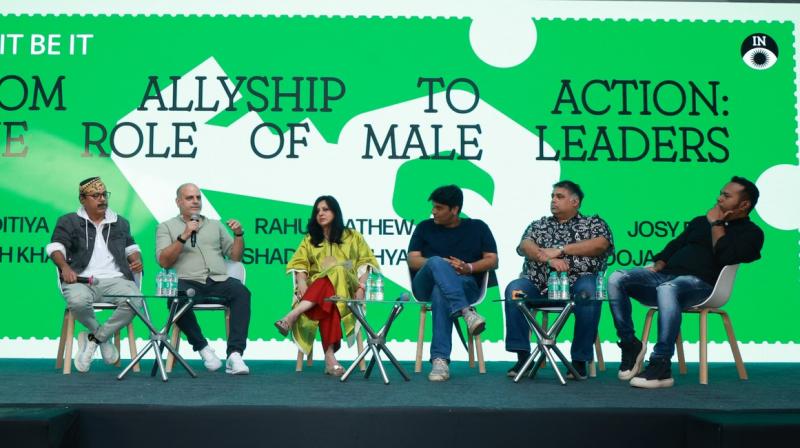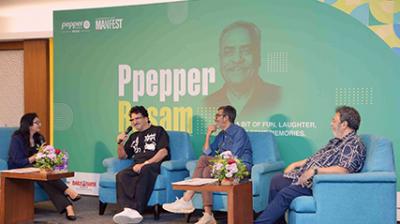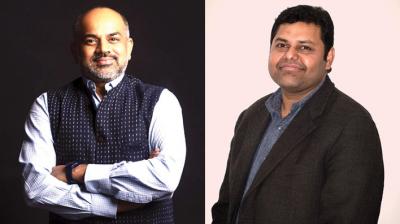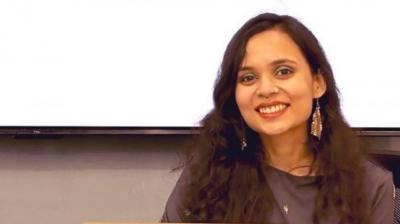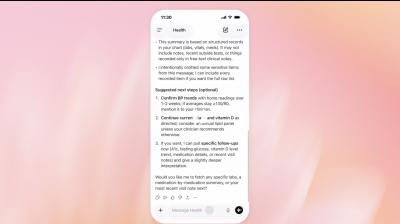The underrepresentation of women in advertising’s creative leadership - a sobering reality of just 10% women in creative leadership roles, with an even more alarming 3% being mothers - formed the stark backdrop for a powerful panel discussion at the first edition of Cannes Lions' ‘See It Be It’ in Mumbai. Hosted by Manifest and Indian Creative Women, the event brought together five of the industry’s most influential male leaders to discuss concrete steps toward gender parity in a conversation aptly titled ‘From Allyship to Action: The Role of Male Leaders in Advertising’.
Featuring Ashish Khazanchi, founder and CCO, Enormous; Harshad Rajadhyaksha, CCO, Ogilvy India; Josy Paul, chairperson and CCO, BBDO India; PG Aditiya, founder and chief creative officer, Talented; Rahul Mathew, chief creative officer, DDB Mudra Group, the live wire session was moderated by Tista Sen, founder, Tista Thinks, who ensured the conversation was a push for tangible answers on the actions being taken within their own organisations.
The panel provided a frank and necessary examination of the advertising industry's gender realities, confirming that the commitment to change must transcend mere conversations, demanding concrete, policy-driven action and a fundamental shift in mindset from the top.
Addressing the alarming statistics
Sen kicked off the session by laying out the concerning figures, demanding the panellists reflect on why so many are leaving the creative advertising industry.
Mathew gave a candid assessment, stating, "We are still not an industry where it feels like the most comfortable place for women." He emphasised that agencies must evolve beyond simply focusing on the work. For women to succeed as creative leaders, agencies must "also have to help them succeed in the other roles in their life."
He stressed that if this support isn't there, a demanding career becomes the "easiest thing to drop," and called for a fundamental "rewiring of agencies" and an honest acknowledgement of the vital role women play: "We need to really acknowledge it honestly and say that that difference that is made is huge. It's not just a nice thing to do. It is very, very critical that we do it."
Enormous' Khazanchi, while noting that his agency operates in a ‘microcosm’ where they would have to actively hire men to achieve gender equality, as ‘60 to 70% of the people in the agency are women’ in leadership roles, however acknowledged the presence of systemic biases that prevent women from ‘staying on.’
Rethinking gender biases and assumptions
The discussion shifted to the unconscious assumptions about gender and creativity the men have had to unlearn over the years.
Sharing his thoughts, Paul said that he considers women as "way ahead of the man in evolution", and this perspective has led him to reject traditional hierarchies. "I realised that Darwin missed something, if you pull back - just after the man was the woman," he added.
He went on to explain why he would want to unlearn the word ‘mentor’, stating that he does not understand mentorship, but believes in ‘partnership’, because for him it was about learning and growing together as a team.
Rajadhyaksha reflected on a ‘bullet’ he dodged early on in his career, referring to ‘harmful’ assumptions he witnessed, where male bosses hesitated to hire women, assuming they would not be able to keep up with the demands of the industry.
He used a potent analogy to describe the industry’s current state of being: "Our industry is at a point where we have only one eye open right now, and until women become equal participants, I don't think we'll be able to see with both eyes open and derive the benefits of that."
Emphasising the importance of gendered empathy and understanding at a leadership level to help retain mid-to-senior-level talent, Rajadhyaksha recounted an instance where a promising employee, who was also a young mother, resigned due to work-life pressures. Owing to the intervention of Ogilvy’s leadership, she was not only able to retain her job but also return with flexibility benefits that allowed her to leave early and better manage the conflicting demands between her professional and personal lives.
“This resulted in a win-win situation for all. And her work has not suffered at all, in fact, it's just been sparkling out there," he added with a smile.
On tropes associated with leadership, Khazanchi noted, “Obviously, a lot of those cliches are not true, one of them being about women and bosses. Many years later, I figured that ‘empathy’ can talk in various kinds of languages. It doesn't always have to be in an alpha way.”
Breaking other stereotypes associated with women leaders, Khazanchi admitted he once subscribed to the archetype that success required everyone, including a woman, to ‘man the room’ by power dressing in a business suit. He unlearned this when a client's head honcho told him she realised she didn't have to 'adjust' for the room. “She could come in there, raise the bar in a dress," he contended.
Mathew pointed out the prevalence of imposter syndrome in the industry, which he believes women succumb to ‘doubly’, as compared to men. Simply giving talented women roles isn't enough, he noted; leaders must constantly provide them with confidence and reassurance, because ‘they will judge themselves a lot harsher than anyone else will.’
The dos and don'ts: advice for women
The final segment of the discussion centred on what the male leaders wished women in the industry would do less of, and what they should do more of.
Acknowledging that his response could be construed as ‘potentially politically incorrect’, Khazanchi, said that more women than men tend to give up and quit after probably a harrowing client meet or a bad experience at work. He wished women would reject such spur-of-the-moment impulses to quit, pointing out that its a universal struggle that both genders often endure.
“Just stay the course, we've all gone through all of it. Stay the course, a better day will come," he advised women.
Rajadhyaksha also expressed a deep concern about what he termed ‘professional suicide.’
"I'm just left with a slightly sinking feeling that we have a lot of women committing professional suicide without asking for help. I think they should stop doing that."
He urged women to open up about their struggles - either with their mentors or any trusted peers, instead of silently putting in their papers.
“Get them to escalate it, get people talking about how you're feeling, but don't throw away a career that you've spent so much effort and time on.”
At the end of the discerning discussion, Aditiya offered a game-changing tip to women: He urged them to aim beyond 'equality' and strive for greatness instead. Citing statistics, he contended that women are often ‘superior’ candidates when it came to discipline, focus, drive, and clarity. His parting advice? "So, don't stop at equality - just go for the whole thing. We'll get to equality if you aim for superiority. Equality is a mythical land. It's your industry, just go for the whole f***ing thing."
He also championed the need for equal parental leave for both men and women as a way to ease the pressure on just one gender bearing the load of parenthood.
“Equal parental leave is a very real policy. Both genders can have the same shitty experience in their career, and it need not be something that just one of the genders suffers from,” he added tongue-in-cheek, noting that in the markets across the world where the policy has been implemented, both men and women take time off work once they have a child, making it a 'universal' problem.
Wrapping up the conversation, Aditiya made a wry but pointed observation: “If it's a problem for everyone, we'll figure it out somehow,” he noted, quoting a woman colleague who summed it up perfectly — “If we make it a guy’s problem, it’ll get solved!”

.jpg)
